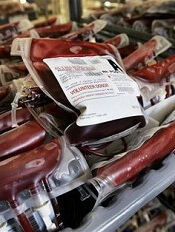
Photo by Elise Amendola
Results of a single-center study seem to support the use of tranexamic acid (TXA) in all eligible patients undergoing hip or knee replacement.
By giving TXA to every eligible patient undergoing hip or knee arthroplasty, a Canadian hospital significantly reduced its use of red blood cell transfusions during these surgeries without increasing the incidence of adverse events or the patients’ length of hospital stay.
The results were published in the Canadian Journal of Anesthesia.
TXA is known to prevent excessive blood loss during surgeries and has proven effective in orthopedic, trauma, and cardiac patients.
However, a few years ago, less than half of eligible patients at St. Michael’s Hospital in Toronto, Ontario, were receiving TXA because of a province-wide shortage. The drug was given only to patients at high risk of requiring a blood transfusion.
The TXA shortage ended in early 2013 and, in October 2013, St. Michael’s implemented a protocol to facilitate universal administration of TXA in patients undergoing total hip or knee arthroplasty.
“We wanted to optimize TXA’s use in patients undergoing hip or knee replacements because these procedures often result in high blood loss and frequently require transfusions,” said study author Greg Hare, MD, PhD, an anesthesiologist at St. Michael’s.
“The drug costs about $10 per patient, while the average cost of transfusing one unit of blood is $1200.”
So every eligible patient undergoing hip or knee replacement received TXA at 20 mg/kg−1. The drug was not used in patients considered at risk of thromboembolic events, stroke, or any other cardiovascular issues.
A total of 402 patients received the drug from October 21, 2013, to April 30, 2014. The researchers compared this group of patients to a group of 422 hip/knee replacement patients treated before the universal administration protocol was implemented (when TXA was given to high-risk patients only).
As expected, there was a significant increase in TXA use post-protocol, from 45.8% to 95.3% (P<0.001). And the rate of red blood cell transfusions decreased from 8.8% to 5.2% (P=0.043).
There was no significant difference in mean preoperative hemoglobin (Hb) levels between the pre- and post-protocol groups—133 g/L-1 and 135 g/L-1, respectively (P=0.073).
But there was a significant increase in Hb in the post-protocol group on days 1 and 3 after surgery. On day 1, the mean Hb was 108 g/L-1 in the pre-protocol group and 112 g/L-1 in the post-protocol group (P<0.001). On day 3, the mean Hb was 97 g/L-1 and 101 g/L-1, respectively (P<0.001).
There was no significant difference between the groups with regard to length of hospital stay. The mean length of stay was 3.93 days pre-protocol and 3.87 days post-protocol (P=0.652).
The adverse events assessed were death, myocardial infarction (MI), stroke, seizure, pulmonary embolism (PE), deep vein thrombosis (DVT), and acute kidney injury (AKI).
There were 13 such events in the pre-protocol group, including 1 MI, 3 PEs, and 9 AKIs. And there were 19 such events in the post-protocol group, including 1 MI, 1 DVT, 1 PE, and 16 AKIs (P=0.368 for all events and P=0.223 for AKIs).
Because TXA decreased the use of transfusions without increasing the rate of adverse events, Dr Hare and his colleagues consider their universal administration protocol a success.
“Making TXA mandatory for eligible patients has made care more efficient, ensuring the best possible care for our patients,” Dr Hare said.
“Other hospitals and surgical centers should consider making TXA mandatory for similar surgeries because it can improve quality of care, decrease the need for blood transfusions, and even save money.”


